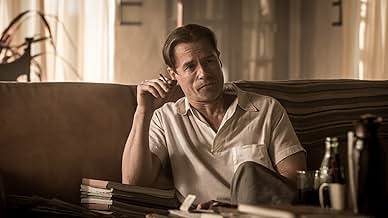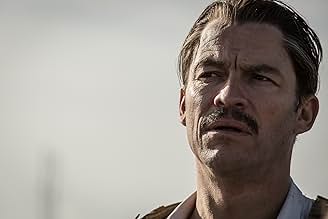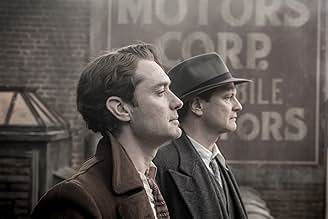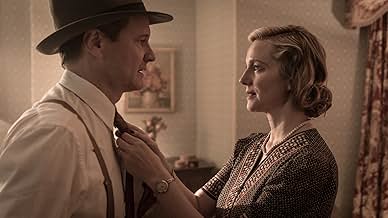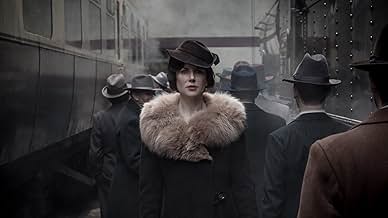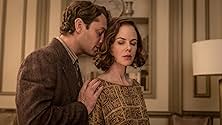VALUTAZIONE IMDb
6,5/10
22.176
LA TUA VALUTAZIONE
Una cronaca del tempo di Max Perkins come editore di libri a Scribner.Una cronaca del tempo di Max Perkins come editore di libri a Scribner.Una cronaca del tempo di Max Perkins come editore di libri a Scribner.
- Premi
- 1 vittoria e 6 candidature totali
Angela Sant'Albano
- Bertha Perkins
- (as Angela Ashton)
Ray Strasser King
- James, Mailroom Clerk
- (as Ray Strasser-King)
Recensioni in evidenza
"O lost, and by the wind grieved, ghost, come back again." ― Thomas Wolfe, Look Homeward, Angel
Max Perkins (Colin Firth) was the genius Scribner's magazine editor, who helped Hemingway, Fitzgerald, and Wolfe become iconic American writers. The watchable Genius, directed by Michael Grandage with a sure understanding of drama, is mostly Thomas Wolfe's (Jude Law) story. The taciturn Max provides the necessary guidance to make sure the book belongs to the writer while Max delivers "good books into the hands of readers."
Although the film is engrossingly placed in Perkin's pv, Wolfe dominates through his exuberant personality and unending energy. While Firth plays Perkins as the conservative but imaginative editor, Law is the reason to see the film, a brilliant acting turn reminiscent of his over-the-top Dom Hemingway. Law simply has never been better than as Wolfe.
The sepia look of the film is appropriate to the 1929 setting of NYC, and Nicole Kidman as his other muse, Aline Bernstein, is memorably smart and vulnerable when it comes to dealing with manic Wolfe. Although Laura Linney as Louise Perkins is lost in spotty, low energy appearances, her general good cheer carries nicely for a Perkins of whom the audience has grown fond.
Because I am always seeking a biography that will show the creative labors of artists, Genius satisfies me when Perkins and Wolfe struggle over the manuscripts. After experiencing Genius, I have seen two sterling examples.
Max Perkins (Colin Firth) was the genius Scribner's magazine editor, who helped Hemingway, Fitzgerald, and Wolfe become iconic American writers. The watchable Genius, directed by Michael Grandage with a sure understanding of drama, is mostly Thomas Wolfe's (Jude Law) story. The taciturn Max provides the necessary guidance to make sure the book belongs to the writer while Max delivers "good books into the hands of readers."
Although the film is engrossingly placed in Perkin's pv, Wolfe dominates through his exuberant personality and unending energy. While Firth plays Perkins as the conservative but imaginative editor, Law is the reason to see the film, a brilliant acting turn reminiscent of his over-the-top Dom Hemingway. Law simply has never been better than as Wolfe.
The sepia look of the film is appropriate to the 1929 setting of NYC, and Nicole Kidman as his other muse, Aline Bernstein, is memorably smart and vulnerable when it comes to dealing with manic Wolfe. Although Laura Linney as Louise Perkins is lost in spotty, low energy appearances, her general good cheer carries nicely for a Perkins of whom the audience has grown fond.
Because I am always seeking a biography that will show the creative labors of artists, Genius satisfies me when Perkins and Wolfe struggle over the manuscripts. After experiencing Genius, I have seen two sterling examples.
Colin Firth and Jude Law Portray editor Max Perkins and his newest client, Tomas Wolfe. Perkins is a tight wound package of seriousness, work being his life. Wolfe is a frenetic writer, eating up everything around him with voracity. The polar opposites take on Wolfe's first novel, "Look Homeward, Angel." I admit, Law's Wolfe is energizer- bunny out-of-control frenetic at times, but it's that kind of mind that gave us one of the greatest (if not the greatest) American novels of all time. Having read "Angel," I completely bought into it. The relationship between editor and writer becomes extremely close, at times casting aside the women in their lives. Laura Linney is Louise Perkins, devoted wife to Max and their 5 daughters. She is also trying to keep her own writing career alive, with little help from her work obsessed husband. Nicole Kidman is Aline Bernstein, a married woman currently shacking up with Wolfe. She was his inspiration in writing "Angel" and is over zealously jealous of Tom's relationship with Max. Like, seriously, wack-job crazy. This role was the weak link for me, didn't like her from her second appearance on screen. The movie moves through their lives, another published book, and on to Wolfe's untimely death. (I am pretty sure that isn't a spoiler.) I don't want to go in to the plot anymore, except to say that I agree with another reviewer about the scene in the jazz club. A really great way to show how minds, and the streaming of thought, can be so different between people.
The cinematography is beautiful, sepia tones bring you back to the years right before and during the depression. Extravagance and soup kitchens, back-to-back. The music bangs out with Wolfe's bombastic behavior, and mellows with Max.
This movie is a movie about writers and readers, for what editor isn't a closet writer? It's also for the same audience, with several nods to a few other greats of that period; Hemingway and F. Scott Fitzgerald, but mostly, to Wolfe. When Max is reading "Angel" through for the first time, his daughter walks in. She looks at the page and says, "Wow, that's a really long paragraph" and Max answers "It started four pages ago..." THAT is Wolfe. That book was the most difficult book I have ever read. This movie is also about, who exactly is the genius? Wolfe is, obviously. But does that make Max, who edited, made these books marketable, and made Wolfe a celebrity of his day, any less of a genius? That is left for the viewer.
The cinematography is beautiful, sepia tones bring you back to the years right before and during the depression. Extravagance and soup kitchens, back-to-back. The music bangs out with Wolfe's bombastic behavior, and mellows with Max.
This movie is a movie about writers and readers, for what editor isn't a closet writer? It's also for the same audience, with several nods to a few other greats of that period; Hemingway and F. Scott Fitzgerald, but mostly, to Wolfe. When Max is reading "Angel" through for the first time, his daughter walks in. She looks at the page and says, "Wow, that's a really long paragraph" and Max answers "It started four pages ago..." THAT is Wolfe. That book was the most difficult book I have ever read. This movie is also about, who exactly is the genius? Wolfe is, obviously. But does that make Max, who edited, made these books marketable, and made Wolfe a celebrity of his day, any less of a genius? That is left for the viewer.
It's a movie about Thomas Wolfe and Max Perkins, with four great actors: Colin Firth as Perkins, sporting a New England accent with overtones of having studied in England; Jude Law as Wolfe, sporting a generic Southern accent; Laura Linney as Mrs. Perkins and the always welcome Nicole Kidman as Wolfe's mistress. It's acting pyrotechnics time and extremely satisfying.
GENIUS is the name attached to John Logan's screen lay adaptation of A. Scott Berg's 1979 novel 'Max Perkins: Editor of Genius' and Michael Granage directs a superlative cast in this recreation of the Depression of the 1930s America. Despite the fact that the film focuses on the raucous life of Thomas Wolfe, the true remarkable character throughout is Max Perkins – the editor at Scribner's in New York City who is responsible for the editing of the books of not only Wolfe but also of Ernest Hemingway and F. Scott Fitzgerald.
The film plays the period well opening in 1929 when writer Thomas Wolfe (Jude Law), decided to keep the appointment made by Max Perkins (Colin Firth), editor at Scribner's, he had no illusions: his manuscript would be turned down as had invariably been the case. But, to his amazement, his lengthy autobiographical novel 'O Lost', which was to become "Look Homeward, Angel" was accepted for publication. The only trouble was that it was overlong (5,000 pages) and had to be reduced. Although reluctant to see his poetic prose trimmed, Wolfe agreed and helped by Perkins, who had become a true friend, managed to cut 90,000 words from the book, with the result that it instantly became a favorite with the critics and bestseller. Success was even greater in 1935 when "Of Time end the River" appeared but Wolfe's inability to cope with the editing process got in the way of his relationship with his mistress (Nicole Kidman) and with Max, and Wolfe died in 1938 after writing 'You Can't Go Home Again', 'The Web and the Rock' and some short stories. Wolfe remained faithful to his appreciation for Max Perkins and died from tuberculosis of the brain a lonely man at age 38.
The supporting cast is superb – Laura Linney as Louis Perkins, Guy Pearce as F. Scott Fitzgerald, Dominic West as Ernest Hemingway – and both Law and Firth carry the story well, maintaining a credible relationship in all its stages. Unfortunately the ending of the film is gushingly saccharine – not at all a good choice. But the movie is a tasty bit of acting and history and deserves to be seen.
The film plays the period well opening in 1929 when writer Thomas Wolfe (Jude Law), decided to keep the appointment made by Max Perkins (Colin Firth), editor at Scribner's, he had no illusions: his manuscript would be turned down as had invariably been the case. But, to his amazement, his lengthy autobiographical novel 'O Lost', which was to become "Look Homeward, Angel" was accepted for publication. The only trouble was that it was overlong (5,000 pages) and had to be reduced. Although reluctant to see his poetic prose trimmed, Wolfe agreed and helped by Perkins, who had become a true friend, managed to cut 90,000 words from the book, with the result that it instantly became a favorite with the critics and bestseller. Success was even greater in 1935 when "Of Time end the River" appeared but Wolfe's inability to cope with the editing process got in the way of his relationship with his mistress (Nicole Kidman) and with Max, and Wolfe died in 1938 after writing 'You Can't Go Home Again', 'The Web and the Rock' and some short stories. Wolfe remained faithful to his appreciation for Max Perkins and died from tuberculosis of the brain a lonely man at age 38.
The supporting cast is superb – Laura Linney as Louis Perkins, Guy Pearce as F. Scott Fitzgerald, Dominic West as Ernest Hemingway – and both Law and Firth carry the story well, maintaining a credible relationship in all its stages. Unfortunately the ending of the film is gushingly saccharine – not at all a good choice. But the movie is a tasty bit of acting and history and deserves to be seen.
I did get caught up in this story. I have admired the work of Thomas Wolfe as well as the accomplishments of F. Scott Fitzgerald and Ernest Hemingway. This film makes Wolfe about as quirky and outrageous as one can be. He reminds me a little of Sheldon Cooper on "The Big Bang Theory," totally self-absorbed and uninterested in the lives and aspirations of others. Apparently, there were numerous inaccuracies in this film as they relate to the publication of the first book, "Look Homeward, Angel," as well as biographical events involving his lover. Obviously, there is always license in these films, but how important are these criticisms? The acting of Colin Firth, Nicole Kidman, and Jude Law make this cook. A view into the lives of the most successful authors of their time and the master editor at Scribner's is beautifully done. There is fantastic cinematography. Even if every fact fails under scrutiny, it gives a portrayal of a fascinating man and his cohort. I recommend it.
Lo sapevi?
- QuizA. Scott Berg's biography "Max Perkins: Editor of Genius", on which the film is based, won the National Book Award in 1978.
- BlooperMaxwell Perkins tells Thomas Wolfe his book needs a new title that will appeal to potential purchasers, and gives the example of F. Scott Fitzgerald changing the title of a novel from "Trimalchio in West Egg" to "The Great Gatsby." The real Perkins, as Fitzgerald's editor, certainly would have known that "The Great Gatsby" was a flop upon its release in 1925 and did not sell well until the 1950s.
- Citazioni
Aline Bernstein: I don't exist anymore. I've been edited.
- Curiosità sui creditiThe title "Genius" appears on the screen 9 minutes into the movie.
- Colonne sonoreFlow Gently Sweet Afton
(Sottish traditional)
Composed by Jonathan E. Spillman
(1873)
Performed by London Voices
I più visti
Accedi per valutare e creare un elenco di titoli salvati per ottenere consigli personalizzati
- How long is Genius?Powered by Alexa
Dettagli
- Data di uscita
- Paesi di origine
- Siti ufficiali
- Lingue
- Celebre anche come
- Pasión por las letras
- Luoghi delle riprese
- Aziende produttrici
- Vedi altri crediti dell’azienda su IMDbPro
Botteghino
- Lordo Stati Uniti e Canada
- 1.361.045 USD
- Fine settimana di apertura Stati Uniti e Canada
- 98.274 USD
- 12 giu 2016
- Lordo in tutto il mondo
- 7.435.006 USD
- Tempo di esecuzione1 ora 44 minuti
- Colore
- Mix di suoni
- Proporzioni
- 2.35 : 1
Contribuisci a questa pagina
Suggerisci una modifica o aggiungi i contenuti mancanti








